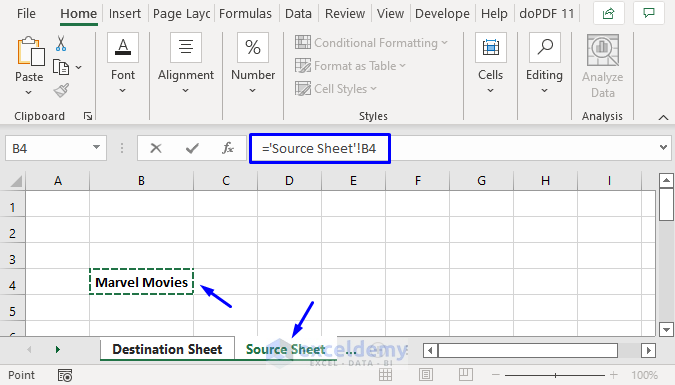Link Excel Sheets Seamlessly: Here's How

Ever found yourself juggling multiple Excel sheets and wishing there was an easier way to manage all that data? Whether you're consolidating financial reports, tracking inventory, or just managing personal budgets, linking Excel sheets can save you time and reduce the risk of errors. Let's dive into how you can effortlessly link Excel sheets to streamline your workflow.
Why Link Excel Sheets?

Linking Excel sheets serves multiple purposes:
- Data Consolidation: Combine information from various sheets into a single, comprehensive report.
- Consistency: Ensure that when you update data in one sheet, it's reflected in all linked sheets.
- Efficiency: Minimize manual data entry, reducing the chances of typos and inaccuracies.
- Collaboration: Enable team members to work on the same dataset without worrying about version control.
Step-by-Step Guide to Linking Excel Sheets

Manual Linking

Manual linking is straightforward but can become complex with large datasets. Here's how you do it:
- Open Both Sheets: Have the source sheet (where the data comes from) and the destination sheet (where you want to display the data) open.
- Select the Cell: In the destination sheet, click where you want the linked data to appear.
- Enter the Formula: Type in the formula
=followed by the workbook name, sheet name, and cell you're linking to. For example:=[Example.xlsx]Sheet1!A1. If the sheets are in the same workbook, the formula simplifies to='Sheet1'!A1. - Drag to Copy: Once you have the formula in one cell, you can drag the fill handle to copy it across other cells if you're linking a range.
Using VLOOKUP and MATCH

For more complex tasks like linking based on criteria, use VLOOKUP or MATCH:
- VLOOKUP: Use this to look up data in another table based on a common identifier.
- MATCH: This function helps find the position of a value within a range, which can be paired with INDEX to retrieve data from any location.
🗝️ Note: The VLOOKUP function has limitations; it can only look to the right of the lookup value. For leftward lookups, consider using INDEX and MATCH or XLOOKUP if available.
Creating Dynamic Links

If your data sources change frequently, you might want to:
- Use Named Ranges: These can make your formulas easier to read and maintain, especially when linking data.
- Utilize External Links: This can be done through Data > External Data Range > Create from Selection, allowing for more sophisticated data connections.
Real-World Applications

Here are some practical examples where linking Excel sheets proves invaluable:
- Monthly Sales Reports: Pull data from different sales reports into a master summary sheet automatically updating totals, trends, and analysis.
- Project Management: Link project timelines, resource allocations, and deliverables across various project sheets for a holistic view.
- Inventory Management: Use links to track stock levels, incoming orders, and outgoing shipments from multiple warehouse sheets.
- Financial Dashboards: Link financial data from different accounts or departments to create real-time financial dashboards.
Best Practices

To get the most out of linking Excel sheets:
- Keep File Paths Consistent: Ensure that all linked files are in a place where all users have access.
- Understand Link Types: Know the difference between relative and absolute references when creating links.
- Error Checking: Regularly check for #REF! errors, which indicate broken links or moved/renamed sheets.
- Update Links: Use Data > Edit Links to manage and update links, ensuring data integrity.
Summary

Linking Excel sheets is not just about data management; it's about creating an ecosystem where information flows seamlessly. By implementing these techniques, you can work more efficiently, collaborate more effectively, and reduce the manual effort in your daily tasks. Remember, Excel's ability to link sheets can transform your work processes, making them more integrated and less error-prone. Whether you're consolidating financial reports, tracking inventory, or managing personal budgets, the power of linked sheets can save you hours and enhance accuracy. So, embrace these methods, and see how they can revolutionize your approach to Excel work.
How do I ensure my links remain intact when moving Excel files?

+
When moving files, use absolute file paths or keep relative paths intact. You can also use Data > Edit Links to manage and update links.
Can I link sheets between different Excel workbooks?

+
Yes, you can link data from different Excel workbooks. Use the workbook name in the formula, e.g., =[WorkbookName.xlsx]Sheet1!A1.
What happens if I delete a sheet with linked data?

+
Deleting a source sheet with linked data will cause errors like #REF! in the destination sheets. Always check for references before deleting.